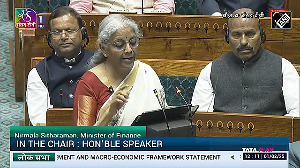Three new criminal laws came into effect in the country on Monday, bringing far-reaching changes in India's criminal justice system.

The Bharatiya Nyaya Sanhita (BNS), Bharatiya Nagarik Suraksha Sanhita (BNSS) and the Bharatiya Sakshya Adhiniyam (BSA) take into account some of the current social realities and modern-day crimes.
The new laws replaced the British-era Indian Penal Code, Code of Criminal Procedure and the Indian Evidence Act, respectively.
Meanwhile, the Delhi police registered its first FIR under provisions of the new criminal code Bharatiya Nyaya Sanhita (BNS) against a street vendor for allegedly obstructing a public way in central Delhi's Kamala Market area on Monday, officials said.
Union Home Minister Amit Shah said the Delhi case was not the first FIR registered in the country. He said the first case under the new laws was about a motorcycle theft registered in Madhya Pradesh's Gwalior at 10 minutes past midnight.
He also said the Delhi police "dismissed" the case filed against a street vendor after an investigation. "By using the provisions of review, police have dismissed this case," he told the media.
The BNS, the Bharatiya Nagarik Suraksha Sanhita (BNSS) and the Bharatiya Sakshya Adhiniyam (BSA) replaced the colonial-era Indian Penal Code, Code of Criminal Procedure and the Indian Evidence Act, respectively.
Delhi police sources said that they will initiate the process of cancelling the FIR registered against the street vendor selling water and tobacco products from a cart that allegedly obstructed a public way in central Delhi's Kamala Market area.
The police will have to inform the court for formally cancelling the FIR, the sources said.
The FIR was registered under Section 285 of the BNS which states, "Whoever, by doing any act, or by omitting to take order with any property in his possession or under his charge, causes danger, obstruction or injury to any person in any public way or public line of navigation, shall be punished with fine which may extend to Rs 5,000."
The FIR was registered under Section 285 of the BNS which states, "Whoever, by doing any act, or by omitting to take order with any property in his possession or under his charge, causes danger, obstruction or injury to any person in any public way or public line of navigation, shall be punished with fine which may extend to Rs 5,000."
The police said 23-year-old Pankaj Kumar, a native of Patna, was found selling water, bidi and cigarettes from a cart under a foot overbridge near the New Delhi railway station around 12.15 am.
The FIR, a copy of which is with PTI, stated that a patrol officer asked Kumar to move his makeshift cart away from the path as it was hindering people's movement.
The officer also asked four-five passersby to become witnesses but they refused, the FIR stated.
After Kumar ignored the officer's instructions, a case was registered at 1.30 am.
The officer used the e-Pramaan app to record the seizures made, the FIR stated.
The app, handled by the Delhi Police's Crime Branch, will directly feed the content to police records for further investigation, an officer said.
The Delhi police has imparted training to its 30,000 personnel -- from the ranks of assistant sub-inspectors and inspectors to assistant commissioners and deputy commissioners -- who are responsible for registering FIRs and conducting investigations.
The force was among the first in the country to start training personnel on the new criminal laws, the officials said.
Meanwhile, Delhi police chief Sanjay Arora said the force has started registering FIRs under the three new laws.
He told reporters during the Delhi police's Commissionerate Day celebrations at Kingsway Camp that the force was fortunate the new laws came into force on this day.
"We are fortunate as today is our Commissionerate Day and, on the same day, these laws are being implemented," Arora said.
Union Home Minister Amit Shah, who piloted the laws, had said the new laws would give priority to providing justice, unlike the colonial-era laws that gave primacy to penal action.
"These laws are made by Indians, for Indians and by an Indian Parliament and marks the end of colonial criminal justice laws," he had said.
Shah had further said the laws were not just about changing the nomenclature but bringing about a complete overhaul.
"Soul, body and spirit" of the new laws is Indian," he had said.
Justice is an umbrella term that encompasses both the victim and the culprit, the home minister had said and added these new laws would ensure political, economic and social justice with an Indian ethos.
According to the new laws, judgment in criminal cases has to come within 45 days of completion of trial and charges must be framed within 60 days of first hearing.
Statement of rape victims will be recorded by a woman police officer in presence of her guardian or relative and medical reports have to come within seven days.
Organised crimes and acts of terrorism have been defined, sedition has been replaced with treason and video recording of all search and seizures made mandatory.
A new chapter on crimes against women and children has been added, buying and selling of any child made a heinous crime and there is a provision for death sentence or life imprisonment for gang rape of a minor.
Offences against women and children, murder and offences against the State have been given precedence in the new law.
Overlapping sections have been merged and simplified, with only 358 sections against 511 in the Indian Penal Code, the sources said.
For example, definitions scattered from sections 6 to 52 have been brought under one section.
Eighteen sections already stand repealed and four relating to weights and measures are covered under the Legal Metrology Act, 2009.
Instances of false promise of marriage, gang rape of minors, mob lynching and chain snatching, among others, are reported but the current Indian Penal Code did not have specific provisions for dealing with such incidents.
These have been addressed in the Bharatiya Nyaya Sanhita, the sources said.
A new provision has been made for cases such as abandonment of women after making sexual relations on the false promise of marriage.
The three laws were based on justice, transparency and fairness, the sources said.
Under the new laws, a person can now report incidents by electronic communication, without the need to physically visit a police station.
This allows for easier and quicker reporting, facilitating prompt action by the police.
With the introduction of Zero FIR, a person can file a First Information Report (FIR) at any police station, regardless of jurisdiction.
This eliminates delays in initiating legal proceedings and ensures immediate reporting of the offence.
An interesting addition in the law is that in the event of an arrest, the individual has the right to inform a person of his choice about his or her situation.
This will ensure immediate support and assistance to the arrested individual.
Besides, arrest details will now be prominently displayed within police stations and district headquarters, allowing families and friends of the arrested person easy access to important information.
To strengthen cases and investigations, it has become mandatory for forensic experts to visit crime scenes for serious offences and collect evidence.
Under the new laws, victims of crime against women are entitled to regular updates on the progress of their case within 90 days.
This provision keeps victims informed and involved in the legal process, enhancing transparency and trust.
The new laws guarantee free first aid or medical treatment to victims of crimes against women and children at all hospitals.
This provision ensures immediate access to essential medical care, prioritising the wellbeing and recovery of victims during challenging times.
Summonses can now be served electronically, expediting legal processes, reducing paperwork and ensuring efficient communication among all parties involved.
For certain offences against woman, statements of the victim are to be recorded, as far as practicable, by a woman magistrate and, in her absence, by a male magistrate in the presence of a woman to ensure sensitivity and fairness, creating a supportive environment for victims.
Both the accused and the victim are entitled to receive copies of the FIR, police report, charge sheet, statements, confessions, and other documents within 14 days.
Courts can grant a maximum of two adjournments to avoid unnecessary delays in case hearings, ensuring timely justice delivery.
The new laws mandate all state governments to implement witness protection schemes to ensure the safety and cooperation of witnesses, enhancing the credibility and effectiveness of legal proceedings.
The definition of "gender" now includes transgender individuals, promoting inclusivity and equality.
By conducting all legal proceedings electronically, the new laws offer convenience to victims, witnesses and accused, thereby streamlining and expediting the entire legal process.
To provide more protection to the victim and enforce transparency in investigation related to an offence of rape, the statement of the victim shall be recorded through audio-video means.
Women, persons below 15 years, persons above 60 years and those with disabilities or acute illnesses are exempt from attending police stations and can receive police assistance at their place of residence.










 © 2025
© 2025